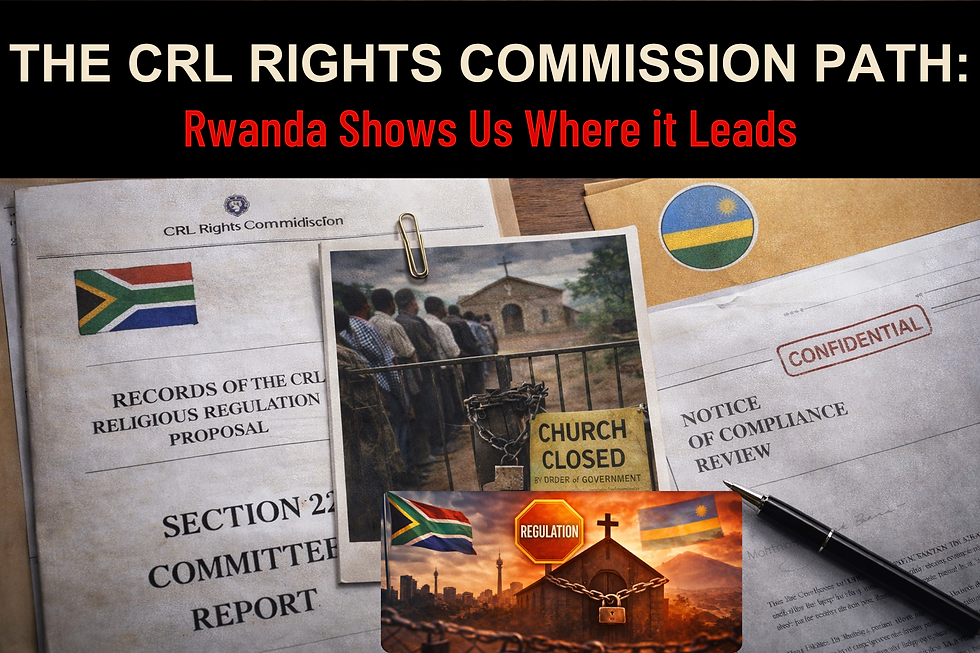SACD Speaks Out: Remarks by Prof. Rev. Musa Xulu – Chair of Section 22 Religious Sector Committee
- SACD MEDIA

- Aug 14, 2025
- 3 min read
The past televised interview with Professor Reverend Musa Xulu, Chair of the Section 22 Committee, offers significant insight into the government’s evolving approach toward the regulation of churches in South Africa. (Watch the full interview here: [https://youtu.be/hPKXJKwa8Hw?si=fSvr9zwTUuVZtC86)
While the stated intention is to protect congregants from abuse, the remarks raise deep concerns for defenders of religious freedom and church autonomy.
Summary of His Position
Prof. Rev. Musa Xulu outlined the mandate of the newly formed Section 22 Committee, tasked with probing “spiritual transgressions” in churches and making recommendations to the state, including possible legislation.

Key points from his interview:
Origins & Mandate –
The committee builds on CRL investigations (2016–2017) into fringe churches accused of harmful or bizarre practices (e.g., inappropriate sexual acts).
Will recommend actions to state bodies (Human Rights Commission, SAPS, NPA, Parliament), including legislative measures if needed.
40 Days & 40 Nights Research Phase –
Intensive groundwork involving nationwide consultations and international benchmarking.
References to Japan closing a mega-church and the USA’s accountability models.
Consultations –
Will start with large umbrella church bodies, then move to independent pastors.
Objective: balance religious freedom with human rights and dignity of congregants.
Potential Legislative Outcome –
Within 18–24 months, envisions creating a religious ombud to handle complaints from church members.
Focus on Vulnerable Groups –
Claims fringe churches often target poor, women-headed households and young women.
Educational Focus –
Believers should be trained to discern spirits; pastors should follow a “call → preparation → commissioning” process.
Warns that churches without proper theological preparation may cause harm.
SACD Critique from a Religious Freedom Perspective
Conflation of Isolated Abuses with the Entire Church
While abuses in some “fringe” groups must be addressed, the interview repeatedly blurs the distinction between criminal acts and the general practice of Pentecostal/charismatic Christianity.
This risks stigmatising independent churches and ministries that operate within the law and biblical principles.
Selective Framing & Examples
Heavy emphasis on extreme and sensational cases (sexual misconduct) without equal acknowledgment of the vast majority of churches that do not engage in such acts.
References to Japan’s closure of a church and “accountability” in the USA are concerning, as both examples involve significant state intrusion into religious affairs — which, if mirrored here, could erode constitutional protections.
Risk of State Overreach
The proposed religious ombud sounds protective in theory, but in practice could become a state-controlled gatekeeper for church operations, undermining the principle that the Church must govern itself under Christ’s headship.
Giving such an ombud statutory power risks opening the door to doctrinal interference.
Religious Freedom vs. Human Rights Framing
Xulu positions “freedom of religion” as something that must be balanced against human rights, rather than recognising that religious freedom is a core human right enshrined in Section 15 of the Constitution.
This framing can justify intrusive state action under the guise of “protecting” people from their own voluntary religious choices.
Potential for Biased Consultations
Starting consultations with umbrella bodies first may sideline independent and smaller congregations, who often do not belong to such structures and may have different views on state regulation.
Doctrinal Overreach
Some of Xulu’s comments move beyond governance and into theological judgment (e.g., criticising churches for lack of “Bible reading” or certain service formats).
The state has no constitutional mandate to define or evaluate what “correct” Christian worship looks like.
SACD Positioning Recommendation
Acknowledge the need to protect congregants from genuine criminal and abusive acts — but insist that this be done using existing laws (e.g., SAPS, NPA, human trafficking, sexual offences legislation) without new religious control bodies.
Emphasise that the majority of churches are self-regulating, accountable to their members, and uphold ethical standards without state interference.
Warn that the proposed ombud could become a political and doctrinal weapon against churches that do not conform to government-preferred theology or practices.
Defend the constitutional right to freedom of religion as non-negotiable and inseparable from other human rights.



Comments